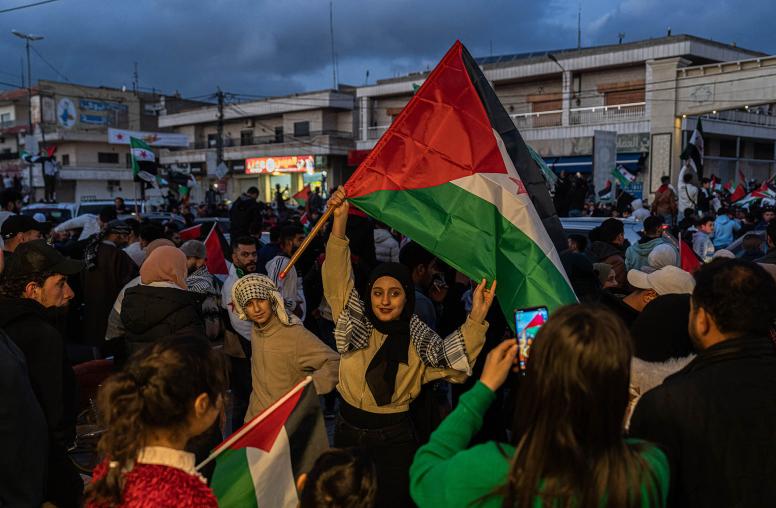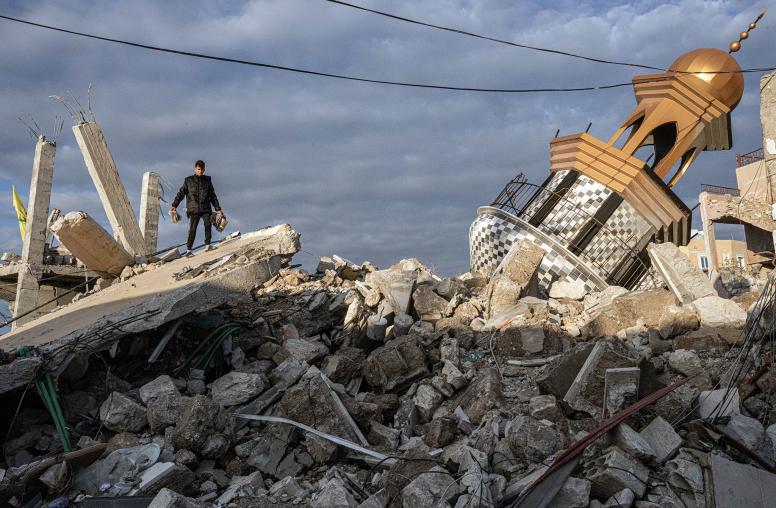This summer, the U.S. Institute of Peace and The VII Foundation are presenting “Imagine: Reflections on Peace,” a multimedia exhibit that explores the themes and challenges of peacebuilding through an immersive look at societies that suffered — and survived — violent conflict. Using historical photos, texts, video profiles and interactive opportunities, the Imagine exhibit brings visitors face-to-face with the realities of violent conflict and asks the question: “Why is it so difficult to make a good peace when it is so easy to imagine?” Below, USIP’s Robin Wright describes an exhibit on Lebanon.
I want to share a personal story from our “Imagine: Reflections on Peace” exhibit that is not explained with the photos. It describes three pictures from the Lebanon exhibit and the transformation that is possible between generations.

Lebanon: 1980s
The above picture shows a man — tall and dark-haired and bearded in the back of a group of fighters. He holds the world record of hijackings — six! I interviewed him for my first book in the early 1980s when he led a militia in Lebanon. I wanted to profile why people are radicalized. It took me a couple years to get to him. When I finally did, he was on a drip recovering from an injury during Beirut’s civil war. His militia men were arrayed around the end of the bed. With his good arm, he was rocking his newborn baby on a little improvised hammock next to the bed.
The hijacker/militia commander’s name was Akl Hamieh, better known by his nom de guerre Hamza (after the first military leader in the service of the prophet Mohammed). His baby was named Chamran, after an Iranian Berkeley-educated physicist working for NASA who later went back to Iran after the revolution and served as the revolution’s first defense minister.

Lebanon: 2017
For the Imagine project, I went back to Beirut in 2017 to write the Lebanon chapter. Among the people I interviewed was Hamza. He invited me to the Bekaa Valley, where we spent many hours. That meeting is captured in the first picture of an aging warrior kissing the tiny hand of his baby grandson and namesake. Hamza pulled out two briefcases while I was there and showed me photos of his exploits. As a major Shiite figure in the region, he was on Khomeini’s plane when he flew from Paris back to Tehran after the shah’s ouster. He fought on the Iranian side during the Iran-Iraq war. The list of his adventures goes on and on — his last exploit was advising the Kurds on how to fight ISIS a few years ago. But he had long ago left the Lebanese militia, disillusioned by its politics and the communal fighting.

While we were visiting, his son Chamran — whom I had last seen as a baby more than three decades earlier — came to visit. So the third photo is of the now grown-up Chamran looking through the photos in one of those briefcases (you can see the back of my head sitting in the next room). Chamran’s son is the baby that the former hijacker is holding in the previous picture. Today, Chamran and his wife are members of Lebanon’s military police.
Lebanon: Postscript
The final anecdote is that a year later, in 2018, I went back to Lebanon, and the hijacker again invited me to the Bekaa Valley. By then he had brain cancer. He invited me to his family’s lunch to celebrate his birthday. It was his last. He died three months later.
The bottom line – a lot can change in a generation.
Tickets to the Imagine exhibit are free and can be booked here.



